THIS WEEK IN CORONAVIRUS
At press time yesterday, Argentina had a total of 72,786 confirmed cases of coronavirus and 1,437 deaths, as compared to 55,343 cases and 1,184 deaths the previous Friday. Although shops not selling essential items could stay open and joggers could continue running during the four days between announcement of a stricter metropolitan quarantine and its coming into force last Wednesday, preparations were already underway earlier in the week – as of Monday, 27 access routes from Greater Buenos Aires to the capital were sealed off and all travel permits withdrawn with only around 3.2 million of the 5.3 million due to be renewed for July (some two million had been renewed when the new phase of quarantine began). The July 1 to 17 phase of quarantine duly dawned on Wednesday with tight commuter controls causing congestion at various points despite up to 30 percent less traffic – one of the snarls holding up two ambulances triggered the theatrical wrath of Buenos Aires Province Security Minister Sergio Berni, who berated Federal Police officers in what was interpreted as another round in his running battle with national Security Minister Sabina Frederic. All commercial activity other than food stores and pharmacies was halted but only in the AMBA Buenos Aires metropolitan area – bars and restaurants reopened in Mar del Plata yesterday with Córdoba due to follow suit next Tuesday. Five of the 47 deputies (out of a total 257) attending a June 25 session of Congress have already tested positive for coronavirus, thus casting a shadow over future parliamentary proceedings. Finally, the last Argentine province resisting Covid-19 for over 100 days ended its shutout yesterday – Catamarca reported its first coronavirus case, a lorry-driver coming from Buenos Aires.
AFI SCANDAL DRAGS ON
Lomas de Zamora federal judge Federico Villena was removed yesterday from the investigation of presumed illegal espionage during the 2015-2019 Mauricio Macri presidency after the La Plata Federal Appeals Court accepted defence objections to the judge, replacing him with his Lomas de Zamora colleague Juan Pablo Augé. On Tuesday Villena had ordered the arrest of 22 people, including Susana Martinengo, the co-ordinator of presidential documentation during the Macri administration, on charges of illegal espionage during that period against various politicians (including Vice-President Cristina Fernández de Kirchner but also leading figures of Macri’s coalition), journalists, trade unionists, businessmen and others. Following these arrests, the judge was pondering whether also to remand in custody Macri’s private secretary Darío Nieto, whom Villena suspected of having received intelligence reports from Martinengo, but now the investigations return to square one. Although this delay would seem to take pressure off Macri, some of the objections to Villena had actually come from Kirchnerites because in 2016 the judge had acquiesced in AFI intelligence bugging the jailed drug-trafficker Mario Segovia, who shared an Ezeiza prison wing (and telephone) with various Kirchnerite corruption suspects, thus permitting their conversations also to be tapped with sometimes embarrassing contents for Fernández de Kirchner.
HISTORIC ECONOMIC SLUMP
On Monday, the INDEC national statistics bureau reported the worst slump in Argentina’s history with economic activity in April down 26.4 percent from the same month in 2019. Although sectors like construction, hotels and restaurants were the leading casualties of lockdown, all falling by over 85 percent, even agriculture (spared quarantine) fell 10.3 percent while manufacturing industry plunged 34.4 percent.
MARKETS/DEBT UPDATE
With the deadline for the government’s bond swap offer still three weeks away, money markets remained quiet last week with the gap between official and parallel exchange rates narrowing somewhat – while Banco Nación closed the week at 73.75 pesos as against 73 the previous Friday, the “blue” dollar edged down from 128 to 126 pesos. Country risk remained stable, up the odd percentage point to 2,540 points. Not much sign of progress in debt negotiations with the creditor group headed by BlackRock investment fund claiming that there had been no meaningful talks since June 17.
MERCOSUR MEET
President Alberto Fernández made his regional summit debut last Thursday although due to the constraints of coronavirus the event was downgraded to a somewhat brief virtual session including only the four original members of Mercosur (Fernández plus his Brazilian, Paraguayan and Uruguayan colleagues, all three right of centre unlike the Argentine leader). No conclusions emerged from the summit since the proposals of the other members to reduce the Common External Tariff by two-thirds and enter into more free trade agreements are opposed by a more protectionist Argentina but neither did the underlying tension between Fernández and his right-wing Brazilian counterpart Jair Bolsonaro rise to the surface (apart from an oblique criticism of “individualistic” approaches mostly aimed against Brazil).
MENEM BACK IN HOSPITAL
Senator Carlos Menem, the only president to govern Argentina continuously for a full decade (1989-1999), marked rather than celebrated his 90th birthday last Thursday since he spent it in an intensive care unit. For the past three weeks Menem has been in and out of hospital with pneumonia complicated by diabetes (although consistently testing negative for coronavirus).
SOY VANDALISM
After a week of government silence over the increase in destructive attacks on grain packs in fields (over 60 cases reported so far this year, almost half last month) despite complaints by opposition politicians and farming associations, Security Minister Sabina Frederic admitted to the escalation last Thursday, expressing concern.
MEXIT?
The province of Mendoza is up in arms over the national government’s decision to freeze funding of the Portezuelo del Viento dam with its former governor (now Radical party chairman) Alfredo Cornejo muttering secession over this “discrimination” and even ultra-Kirchnerite Senator Anabel Fernández Sagasti expressing solidarity with provincial claims. Cornejo even raised the idea of Mendoza going it alone as a standalone state.
FLORESTA DISCOVERY
Federal judge Daniel Rafecas revealed on Thursday that he had identified a family home in the Floresta neighbourhood as a clandestine detention centre during the 1976-83 military dictatorship. The house (property of SIDE intelligence until 1977) is located in the same block as the much larger and more notorious Automotores Orletti detention centre, which was run by the First Army Corps and was the object of a trial in its own right ending in a dozen convictions. The identification was aided by the declassified documents released by the United States in recent years, which included a specific mention of this address. Those detained in what may have been a preliminary clearing house are said to have included Uruguayan exiles.
– TIMES



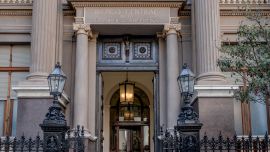

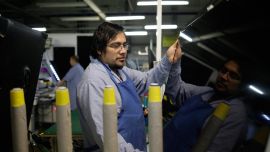





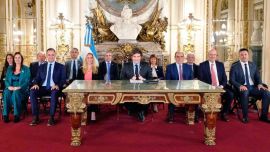
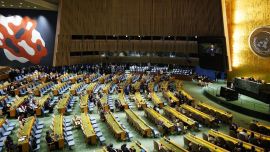
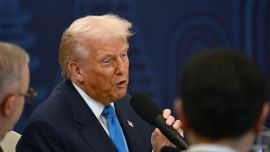
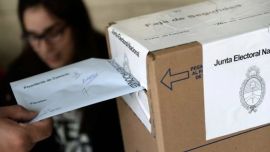
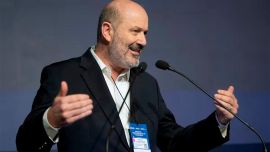
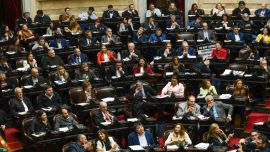
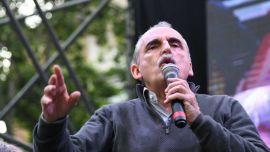

Comments